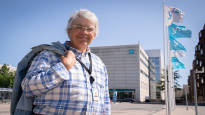– An era is coming to an end.
– A huge amount of know-how is lost.
Thus Jyrki Saarikoski colleagues describe the retirement of a long-time foreign journalist.
Saarikoski’s taival in Yles already started in the early 1980s. In his varied career, he has had time to act as a Moscow correspondent between 1990 and 1995, host current affairs programs and report on crisis centers around the world.
Since last year, Saarikoski has closely followed Russia’s war of aggression in Ukraine.
It has brought back to his mind the horrors of the Chechen wars, like the Russian baboons, or baboons, who lived in the ruins of destroyed buildings and basements in the Chechen capital of Grozny in the spring of 1995.
– Indiscriminate violence was directed at everyone, regardless of nationality, says Saarikoski, who has reported many times in war-torn Chechnya.
According to Saarikoski, violence in Ukraine is similar. Although Ukraine is an independent state, in the eyes of the Russian leadership it is part of the Soviet Union. His brother, with whom we are the same people.
Even from Chechnya, the West should have understood that the Russian leadership can use extreme violence on a region that has been declared its own at some point. A previous connection does not prevent or weaken the use of violence, says Saarikoski.
– It’s a sad lesson.
Western countries followed the events in Chechnya from the sidelines. They were considered an internal matter of Russia.
The chaotic 1990s
As a correspondent, Saarikoski twice saw tanks in the center of Moscow. In 1991, the old Soviet leadership attempted a coup, and in 1993, the president Boris Yeltsin suppressed the Conservative rebellion.
The coup attempt collapsed on its own impossibility in a few days. The events of 1993 were more frightening.
There was a fierce struggle for power in Russia after the collapse of the Soviet Union. The power struggle between President Yeltsin and the conservatives escalated into a violent confrontation in the fall of 1993.
On Yeltsin’s orders, the tanks fired on the parliament building called the White House in Moscow, where there were opponents of the president.
During the weeks of violence, Russians lived in fear of civil war. It was the only moment when Saarikoski seriously considered sending his family to Finland.
According to Saarikoski, the essential thing was that Yeltsin was unable to resolve the matter politically or peacefully.
The incident showed that military force can be used in the city center. And that Yeltsin, who was considered liberal, progressive, democratic and pro-Western – the so-called good guy – Saarikoski reflects.
– At that point, you could have already been quite worried about what the culture of the country’s use of power is like.
Despite the sad state of Russia, there is still optimism in Saarikoski. He reminds that the country also has a tolerant side, which he believes still lives among the people.
– All kinds of strength exist. To that extent, one could be optimistic about Russia in the long term.
Instead of decision makers, ordinary people
As a journalist, Saarikoski has always been more interested in the thoughts of ordinary people than those of decision-makers.
When the continuous monitoring of world events becomes more and more hectic, Saarikoski hopes that journalists still have time to be present.
– Let’s go to the place and show what happens in people’s everyday life. Doesn’t stay at the top level.
Saarikoski himself has visited several crisis areas affected by earthquakes. In them, he has been impressed by people’s desire to help each other.
– When people’s lives are literally in ruins due to a sudden disaster, human communities very quickly organize themselves into communities of mutual aid, where they support each other.
It creates hope in the midst of suffering.
In crisis areas, Saarikoski is also motivated by the need to tell the world about the events. Then things can get better.
– Of course, journalism does not include declaring. That’s enough to show what’s going on.
Now Saarikoski no longer talks about world affairs. My mind is wistful but calm.
– During 40 years, what could be given has been given.
Next, the veteran journalist heads to the eastern Gulf of Finland to do his favorite hobby, sailing.
The topic can be discussed until 23.00 on June 23, 2023.
